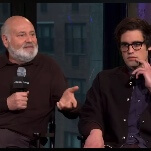The New Cult Canon: Fallen Angels
"Forget him, and it's like forgetting everything.
All sense of direction seems lost, like losing oneself. Forget him, and it's
like forgetting the joy of life. It's like a stab in the heart, bleeding and in
agony." —Voiceover, Fallen Angels
Wong Kar-wai's Fallen Angels almost plays better in the
memory than onscreen, which isn't meant as an insult. I've seen the film three
times now, and every time, it slips through my consciousness like a beautiful
vapor, not unlike the tracks of neon blur that pass its characters by as they
zip through the urban nightscape on fast-moving trains and motorcycles. There's
very little tangible narrative architecture; true to Wong's jazz-like
improvisational style, he doesn't seem to know where he's going until he riffs
his way there, and he expects his audience to live similarly in the moment.
Storytelling means virtually nothing to him—connecting these images into
something cohesive seems like a headache at best, a production-stalling
nightmare at worst. He winds up making mood mean more to his work than perhaps
any other major filmmaker.
For this column, I could have selected any number
of Wong's films—Chungking Express, Happy Together, In The Mood For Love, 2046, et al.—but Fallen
Angels,
while not his best movie, is probably the sharpest distillation of his
nocturnal, ultra-romantic sensibility. It's a film of glimmering surfaces, with
nothing to pin it down other than its characters' collective melancholy. The
moments that linger are wholly cinematic: a motorcycle speeding at double time
through a highway tunnel, the lines of a woman's body as she prowls a would-be
lover's apartment in latex and fishnets, the driving rain that beckons
strangers to play in the streets, the golden glow of a jukebox against black
bangs and ruby-red lipstick. Wong and cinematographer Christopher Doyle supply
seductive images like these with stunning regularity, but as each shot yields
quickly to the next, they flutter away into the ether. It's hard to make a
great argument for their cumulative value, but as pure sensory experience,
movies like Fallen Angels are a rare treasure.
Fallen Angels features very little dialogue, but
interior monologues like the one quoted above are rampant, and granted to all
three of the major characters. There's a simple reason for this: They're in a
Wong Kar-wai movie, which means they spend far more time trying and failing to
connect than actually connecting. Along with a wave of contemporaries like Tsai
Ming-liang (What Time Is It There?) and Hou Hsiao-hsien (Flowers Of Shanghai), Wong is a poet of urban
alienation and ennui, though his sense of whimsy, his swooning romanticism, and
his—let's face it—"cool" set him apart from the rest. His
characters tend to exist in a perpetual state of longing, and the world
conspires in subtle and unsubtle ways to either keep them apart, or limit their
interaction to a brief, tantalizing taste. They can grow and learn and maybe
find some peace in their lives, but nobody's walking arm-in-arm into the
sunset.
Fallen Angels was originally conceived as the third
story in Wong's 1994 diptych Chungking Express, but typical of his
seat-of-the-pants style, it never quite fit into that movie, and it took on a
life of its own. In retrospect, Fallen Angels' darker tone and visual
palette seem like the wrong fit for Chungking Express' more buoyant spirit,
though there's plenty of crossover between the two, including references to
expired cans of pineapple and locations that situate them within the same
general vicinity. Leon Lai, who made his name as a Hong Kong pop star, and
Michelle Reis, who made hers as 1989's Miss Hong Kong, bring their absurd
beauty to the unnamed roles of a contract killer and the agent who handles him,
respectively. The two have worked together for three years, but they never
cross paths: The Killer carries out an assignment, and the Agent handles the
rest, taking particular relish in scrubbing his apartment of evidence (and in a
later scene, fantasizing more explicitly about its tenant). Here she is at
work:
For his part, the Killer professes to enjoy the
job because all the decision-making is out of his hands, and he doesn't have to
worry himself about the whos, whens, and wheres of a person's death. Though
that sounds like an attempt to distance himself from the moral implications of
being an assassin, he says he's just "lazy." Nonetheless, he wants out of the
business, which means he has to end his partnership with the Agent, who's
devastated by the news. Meanwhile, Wong follows a parallel storyline involving
a mute small-time crook (Takeshi Kaneshiro) who makes his living breaking into
shops after hours and badgering night-owls into becoming his customers. Every
night, he opens a new business, from butchering to doing shampoos and shaves at
a barbershop to playing short-order cook at a fast-food stand. It's tempting to
claim him as the wild card, offering a comedic counterpoint to the angst-ridden
duo at the film's center, but later scenes about his complicated and ultimately
touching relationship with his father give the role unexpected emotional depth.























![HBO teases new Euphoria, Larry David, and much more in 2026 sizzle reel [Updated]](https://img.pastemagazine.com/wp-content/avuploads/2025/12/12100344/MixCollage-12-Dec-2025-09-56-AM-9137.jpg)
















